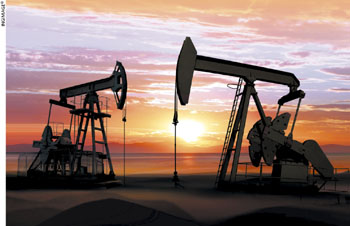BEHAVIOURAL ECONOMICS
THE OIL PRICE BAROMETER
Praveen Jaiswal gauges the impact of human behaviour on the price of oil
 There is an old tale that depicts the way the energy market behaves. It revolves around a physicist, an engineer and an economist who were facing the problem of how to divide an apple into three equal parts.
There is an old tale that depicts the way the energy market behaves. It revolves around a physicist, an engineer and an economist who were facing the problem of how to divide an apple into three equal parts.
The physicist suggested they use Einstein’s relativistic interpretation of gravitational theory coupled with the problem of two-body motion in a central force field to divide the apple into three equal parts.
In contrast, the engineer remarked that this was too theoretical! He wanted to devise an accurate balance that could divide the apple into three parts, leaving equal weights up to the fourth decimal place.
And the economist came up with the final solution. He said: “Why take the trouble? Let us divide this apple into three parts and assume they’re equal.”
The physicist in the above story is a reflection of financial institutions and oil companies. They use complex models to derive the future price of oil based purely on past trends. But they forget that the price of a commodity is also affected by ‘behavioural aspects’ as end-users are human beings whose behaviour, beliefs and attitudes define purchasing patterns.
These complex models are unable to factor in the ‘human element’ and so the outcomes are mostly flawed.
An economist tries to predict basic demand and supply dynamics. So are oil prices really driven by supply and demand?
The spontaneous answer to this question is ‘yes.’ But at various times in the past, the price of oil has dropped and risen to lows and highs without too much change in the global perspective.
Perhaps oil supply and demand have special characteristics that influence prices. If so, do economists have a model that predicts supply and demand, and delineates a relationship between them and the price of oil?
The answer is ‘no.’ So there’s more reason to believe that the element of human behaviour is a significant variable.
With the advent of complex mathematical models, economics as a science has lost its nature as a social science and connection with human beings. The language of economics talks about investment, inflation, deflation, GDP and so on. And many economists take pride in creating models of reality that are too complex for ordinary people to understand.
These models ignore the human and social character of the economy that can never be expressed in a mathematical equation. This disconnect of modern science with the population is hampering creativity that needs to be purely country-specific especially with respect to the inclusion of renewable energy in the energy mix.
Economists need to understand that people do not simply consume oil or electricity but rather the services they provide. We consume petrol and diesel for commuting purposes; kerosene, coal and LPG for cooking; and various other forms of energy to generate electricity.
And therein lies the catch: energy consumption is not a behaviour but a consequence of behaviours (e.g. turning the lights off to save electricity or carpooling to reduce petrol expenses).
A consumer is affected in several ways by oil price volatility. Any sudden increase in expenditure on energy affects purchasing power, which in turn has a trickle-down effect on the economy. And consumer incomes do not adjust correspondingly in line with the ensuing inflation from high oil prices.
Economists argue that human behaviour is far from rational in opting for an energy mix. They believe that people act in accordance with numerous biases and irrational impulses whenever prices fall or rise steeply.
More often, human behaviour tends to amplify extreme movements rather than calm them. These biases come in many forms: there’s either a herding tendency or anchoring – i.e. the tendency to give too much weight to an event. Governments especially of oil-importing nations lack the flexibility to adjust local prices irrespective of global price movements.
History is witness to the fact that most economic crises are a result of human behaviour.
People initially accept what policy makers say and financial institutions propagate in times of a booming economy, and make purchase decisions based on trust.
When these predictions turn out to be untrue, many people lose their savings, homes and jobs, followed by experiencing emotions such as anger, sadness, distrust, loss of self-esteem, anxiety and depression. These outcomes are reflected in political upheavals that make the job of a government more difficult in stabilising the economy.
Economics is a social science; it is about people, and how we organise ourselves to meet our needs and enhance our well-being. Ultimately, all economic behaviour is human behaviour. Sometimes, institutional forces of government and bureaucracy appear to take over. But if one looks closely at any economic outcome, one finds that human decisions or behaviour ultimately determine them.






Leave a comment